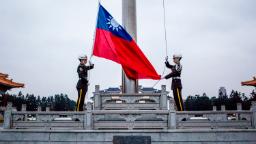
In total there are hundreds of millions of dollars of arms sales to Taiwan that Congress wants updates on. The hope is to “pull back the curtain” on what is contributing to the delay of US arms arriving in Taiwan and come up with solutions to expedite deliveries, one congressional aide explained.
The Republicans have also grown frustrated by the lack of answers the administration has provided to them when asked about the status of certain deliveries, congressional aides said.
“The Arms Exports Delivery Solutions Act ensures that defense equipment already purchased from the U.S. by Taiwan and other allies in the region are tracked and delivered as efficiently as possible as the Chinese Communist Party eyes further aggression. I will do all I can to ensure the United States remains a leader on the world stage,” Kim said.
McCaul cited pronounced concerns as China has ramped up its aggression in the region, particularly aimed at Taiwan.
“Delayed deliveries of Congressionally-approved sales to Taiwan are undermining our ability to deter an attack from China. This is incredibly concerning as China ramps up its belligerence towards Taiwan,” McCaul said.
“The Russian invasion of Ukraine has resulted in a major war, and there are now consequences for production and deliveries and strategic decisions. Weapons don’t grow on trees. We are sure the administration is talking about this immense challenge, we need to see what the real facts are and what the decisions are,” a second congressional aide said.
The new legislation would require the secretary of defense and the secretary of state to report to congress by March of 2023 with details including: the estimated delivery dates for arms transfer of $25 million or more to Taiwan, Japan, South Korea, Australia and New Zealand that have been approved by congress since October 2017, but not yet completed. The departments will also have to explain any delivery delays and lay out how the transfers could be expedited. Finally, the report will be required to describe what the interagency is doing to support the operational capabilities so the systems and specific actions to expedite deliveries to Taiwan.
The reason that the members are looking for an update on arms sales to multiple partners in the region, not just Taiwan, is because they view the US alliance with those countries as being key in shaping how the US would respond to any potential Chinese invasion of Taiwan.
Director of National Intelligence Avril Haines said this week that Chinese President Xi Jinping “quite clearly sees reunification of Taiwan as a goal” and that he is planning for the possibility of taking Taiwan by military force, even if he is not intending to do it that way. Earlier this year Haines said that the threat to Taiwan between now and 2030 is “acute.”
Members of Congress recognize that the way the US responded to the Russian invasion into Ukraine could not be replicated if China invaded Taiwan.
“With Ukraine we saw the US government get energized and move at a pace that isn’t normally done unless it is an emergency situation, but that may not be the circumstances in a Taiwan scenario. So you need to be thinking before that emergency is underway, it will likely be impossible to resupply Taiwan once an invasion occurs,” the second aide said.
While it normally takes years for the arms sales to any country to actually be fulfilled, there is one sale of stingers to Taiwan that was notified to Congress in 2016, but the production of the weapons has not even begun, the first aide said. And just two months ago, Taiwan’s Ministry of National Defense announced that a delivery of US howitzers was expected to be delayed by years, pushing delivery to 2026 at the earliest.
“Once an arms sale gets approved by Congress, the process is punted back to the State Department, the Pentagon and the defense companies. At that point, it is a tremendous challenge to gain transparency on whether the delivery has actually occurred,” the first aide added.
While Republican aides described efforts to get their Democratic colleagues to support their legislation, there were no Democrats who signed on to cosponsor the legislation. House Foreign Affairs Subcommittee on Asia, the Pacific, Central Asia, and Nonproliferation Ranking Member Steve Chabot of Ohio and Rep. Brian Mast of Florida joined Reps. Kim and McCaul as cosponsors.




